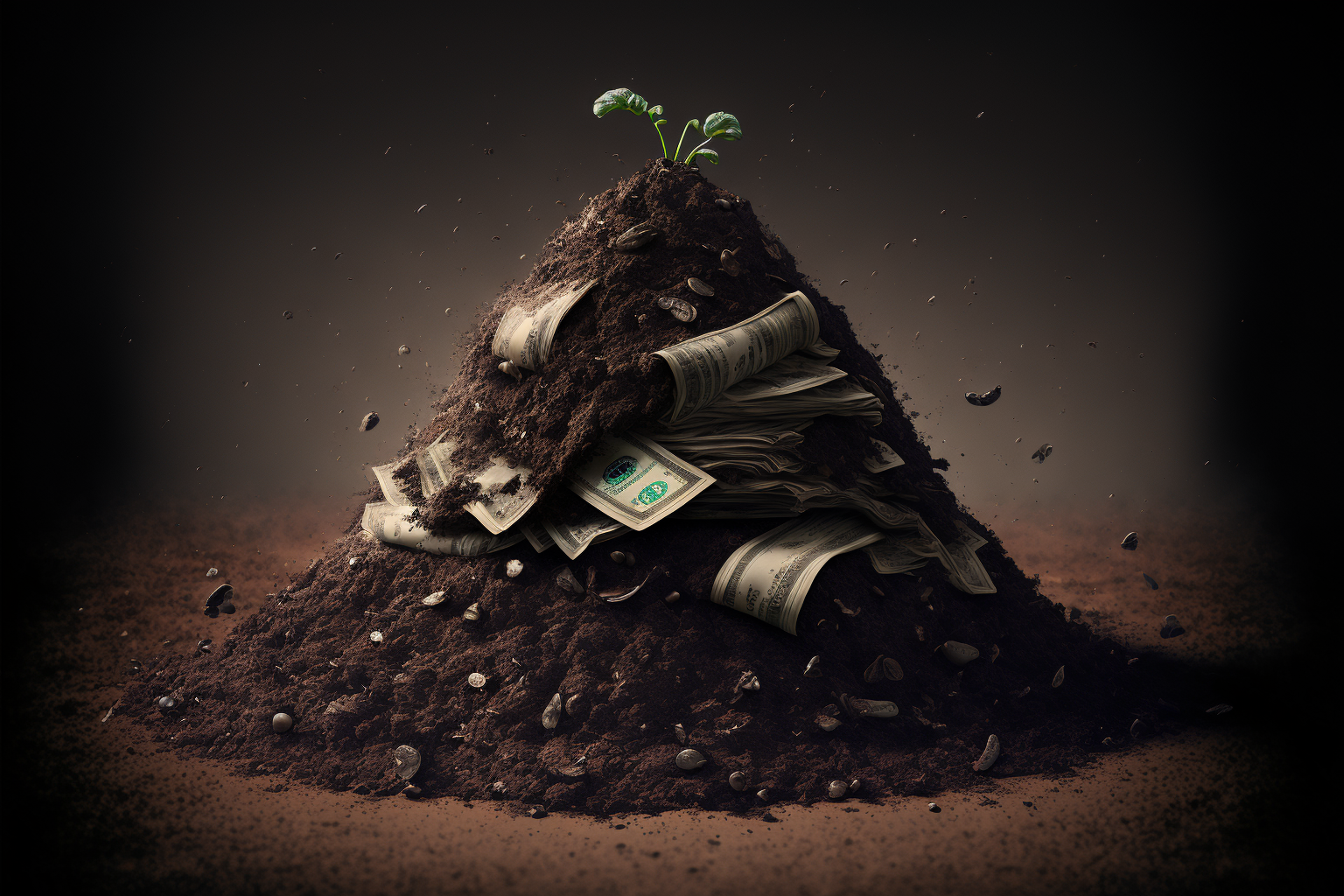‘Credo’ es la final parte a una serie de tres alegorías urbanas enfocadas en el cultivo institucional, las decadencias del sistema, y las organizaciones sin fines de lucro que abundan y forman parte del desarrollo social, económico, cultural, y humanitario de nuestra actualidad. En los estados unidos existen más de un millón de organizaciones benéficas que promueven y luchan distintas causas; es por eso que en la multicultural, en la variedad de estímulos, y en la facilidad con que muchos de estos líderes sociales logran adquirir los financiamientos, existen ciertas facilidades para el abuso, la corrupción, y la manipulación de estas instituciones que endurecen los corazones de los menos afortunados y enriquecen a una minoría rapaz.
Creo en un solo DIO$.
Creo en un solo dios todopoderoso capaz de darme la libertad de ser su igual, de estar lo más lejos posible de la inmundicia del ser inferior a mí, aquel que no tiene la menor conciencia de sí mismo.
Por fín, hemos llegado al credo. Me preguntaba hacia dónde apuntaba el tridente: economía, personas y religión. Quisiera mencionar que pocas veces me dejo llevar por las visiones que los ancestros me susurran al oído en la noche, donde la calma no es solo una virtud inalcanzable sino también un completo extraño que cruza por calles oscuras, sin lámpara, sin una luna, sin ventanas, en ese andar donde sólo emanan palabras poseídas de mí como un esquizofrénico en la oscuridad. Dejo que esta maldición suceda una y otra vez, lo que algunos interpretan como una especie de etiqueta, pero otros ven como una forma abstracta de ocultar mi completa locura. Aunque en las alegorías figurativas de la realidad en que vivo, las visiones no se asemejan a la verdadera sustancia de lo que me hace ser, puedo sentir que son reales a su manera, una de las presencias monstruosas de nuestra realidad compartida —también como el cuervo que observa y canta, así como el obrero que bajaba de la catedral, de ese pedestal social que vigila los acontecimientos, confiando en las gárgolas que sonríen con sus colmillos de piedra y sus garras, los instrumentos de su codicia, enloqueciendo experimentar miedo ensimismado.
Guiado por estas antiguas partituras salvajes, el antagonista abre su corazón al oráculo, avanza y crea el camino que le dará sosiego y aliento a su sangre. El credo quiere expiar una de las alabanzas más comunes al dios más amado: el dinero bendito.
Desde mi aventura en la política local a principios de año, hasta mi posición actual como luchadora social y discípula en los medios, mi falta de visión y desconocimiento fueron disminuyendo hasta que comencé a madurar de formas extrañas incluso para mí que lo experimenté.
El joven autor que les acompaña ha caído en el silencio en uno de los terrenos más difíciles de mantener, aquel que al principio de sus pasos sobre el papel expresó diligentemente un reclamo de la justicia que necesitábamos, como las de sus inspiraciones literarias. Fue justa de lanzas, guerra de guerrillas, violencia a través de altoparlantes, tintero, palabras altisonantes.
En un antiguo manuscrito traducido del latín, leo una frase que se atribuye a un diseñador de exteriores árabe: Mantén la calma y ataca con precisión mortal.
“Quiesco, tundendo, lethali.”
Podría interpretar esto como una estrategia de lucha, pero en poesía tiene aún más sentido. Nos anima a observar en silencio cada acontecimiento externo a nuestro propio ser, como una interacción hacia nosotros o incluso ajena al centro magnético del universo personal.
La letalidad está relacionada con la muerte, con una acción única y efectiva para derrotar a nuestra oposición. Sin embargo, la palabra — espada afilada capaz de crear y descrear de la misma manera — se convierte en el instrumento más valioso para quien sabe esperar.
Luz de luz.
Llevaron sus maletines llenos de morraya, habiendo terminado de parir las milpas para este año. El invierno cubrió todas las casas de los pocos que quedaron con un frío blanco. ¿No es una coincidencia que los monstruos más odiados siempre vivan en las lejanas colinas? Intenté subir pero al llegar solo, me encontré con que las montañas esperaban con más del frío acumulado por el metal con el que se envolvían estos ogros carroñeros. Bebieron licor y conversaron con el fuego extinguido del cinismo. Abrí dos ventanas pero no encontré más luz. Eran las 9 de la mañana y las nubes grises dejaban una fuerte nevada que caía sobre los caminos, dejándome inmóvil, sin poder volver al calor de la gente.
Brillaba un objeto enorme al final de aquel pasillo. Era un altar, un montón de estiércol abultado y maloliente. Brotaron sonrisas, pupilas dilatadas acercaron su deseo a querer eso y mucho más. Se quitaron sus pocas ropas, se arrojaron al vacío, empaparon sus mentes, sus bocas, sus ojos y sus oídos en ese fango luminoso. Besaron los pies de todos los que quedaron, quienes gritaron, conmocionados, en una procesión de codicia.
Ellos querían que expresara cómo me sentía, pero el hedor me inquietaba. Callé no por miedo, ni porque quisiera estar a favor de ellos, ni porque me sintiera inferior; Guardé silencio porque era la mejor opción. Estos últimos años, he soltado tanto la lengua que sabía que solo pondría una gran carga sobre mis hombros, así que opté por el silencio..
Lo que tenemos que hacer es callar. Tenemos que escuchar.
Tenemos que crear un nuevo credo juntos. Uno que no adora a la pila de estiércol de nuestro dios del dinero.
Juntos, debemos destruir ese falso ídolo, cortarlo y construir algo nuevo.
Quiesco, tundendo, lethali.
Sigue a Ulises en Instagram: @ulisesyairnavarro
‘Creed’ is the final part of a series of three urban allegories focused on institutional cultivation, the decline of the system, and non-profit organizations that abound and are part of social, economic, cultural, and humanitarian development of our present. In the United States there are more than a million charitable organizations that promote and fight different causes; that is why in the multicultural, in the variety of stimuli, and in the ease with which many of these social leaders manage to acquire financing, there are certain facilities for the abuse, corruption, and manipulation of these institutions that harden the hearts of the less fortunate and enrich a rapacious minority.
I believe in only one G¤D.
I believe in a single all-powerful god capable of giving me the freedom to be his equal, to be farthest from the filth of the being inferior to me — the one who does not have the slightest awareness of himself.
Finally, we’ve arrived at the creed. I was wondering where the trident was pointing — economy, people, and religion. I would like to mention that I rarely let myself be carried away by the visions that the ancestors whisper in my ears at night, where calm is not only an unattainable virtue but also a complete stranger who crosses through dark streets, without a lamp, without a moon, without windows, in that walk where only possessed words emanate from me like a schizophrenic in the dark. I let this curse happen again and again, which some interpret as some kind of label, but others see as just an abstract way to hide my complete madness. Although in the figurative allegories of the reality in which I live, the visions do not resemble the true substance of what makes me me, I can feel that they are real in their way, one of the monstrous presences of our shared reality — as well as the crow that observes and crows, as well as the worker who came down from the cathedral, from that social pedestal that watches developments, trusting the gargoyles that smile with their stone fangs and their claws, the instruments of their greed, making the madman experience self-absorbed fear.
Guided by these ancient wildling scores, the antagonist opens his heart to the oracle, advances and creates the path that will give his blood calm and breath. The creed wants to expiate one of the most common praises to the most beloved god: the blessed money.
From my adventure in local politics at the beginning of the year, to my current position as a social fighter and disciple in the media, my lack of vision and ignorance diminished until I began to mature in ways that were strange even to me who experienced it.
The young author who accompanies you has fallen into silence in one of the most difficult areas to maintain — the one who at the beginning of his steps on paper, diligently expressed a demand for the justice we needed, like those of his literary inspirations. It was a joust of lances, guerrilla warfare, violence by way of loudspeaker, inkwell, high-sounding words.
In an ancient manuscript translated from Latin, I read a phrase that is attributed to an Arab exterior designer: Stay calm and attack with deadly precision.
“Quiesco, tundendo, lethali.”
I could interpret this as a fighting strategy, but in poetry it makes even more sense. It encourages us to observe in silence every event external to our own being, as an interaction towards us or even alien to the magnetic center of the personal universe.
Lethality is related to death — with a unique and effective action to defeat our opposition. But nevertheless, the word — a sharp sword capable of creating and uncreating in the same way — becomes the most valuable instrument to those who know how to wait.
Light of light
They took their briefcases full of morraya, the cornfields having finished giving birth for this year. Winter covered all the houses of the few that remained with cold white. Is it not a coincidence that the most hated monsters always live in the distant hills? I tried to go up but arriving alone, I found that the mountains awaited with more of the cold accumulated by the metal with which these ogre scavengers wrapped themselves. They drank liquor and had conversations with the extinguished fire of cynicism. I opened two windows but I did not find more light. It was 9 o'clock and the gray clouds left heavy snow that fell on the roads, rendering me immobile, unable to return to the warmth of the people.
A huge object shone at the end of that corridor. It was an altar, a heap of bulging and stinking manure. Smiles sprouted, dilated pupils brought their desire closer to wanting that and much more. They took off their few clothes, threw themselves into the void, drenched their minds, their mouths, their eyes, and their ears in that luminous mud. They kissed the feet of everyone who was left, who cried out, shocked, in a procession of greed.
They wanted me to express how I felt, but the stench disturbed me. I was silent not out of fear, or because I wanted to be in favor with them, nor because I felt inferior; I was silent because it was the best option. These last few years, I have loosened my tongue so much that I knew it would only put a heavy load on my shoulders, so I opted for silence.
What we have to do is shut up. We have to listen.
We have to create a new creed together. One that doesn’t worship at the manure pile of our god of money.
Together, we must destroy that false idol — cut it down and build anew.
Quiesco, tundendo, lethali.
Follow Ulises on Instagram: @ulisesyairnavarro


